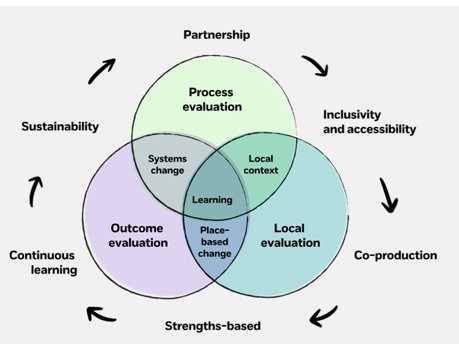Plymouth is one of only 4 places in the UK where NSPCC is investing in a place-based initiative to develop and learn what works to prevent abuse. In Plymouth we are focussed on working with children and young people, communities and professionals to develop evidence on things that work to prevent child sexual abuse.
Together for Childhood – NSPCC
In Together for Childhood, we are tracking progress towards our goals of prevention whilst collecting evidence and improving as we go.
The learning and evaluation model applied to Together for Childhood aims to show how a place-based approach can facilitate systemic change as a means of solving a complex social problem. The model is about understanding how local processes influence intended and unexpected outcomes and generating a nuanced picture of how best to achieve change and prevent child abuse.
Our learning and evaluation model is developmental and iterative, underpinned by the design principle of continuous learning, and blends locally embedded and centralised research and evaluation expertise.
We learn about how Together for Childhood makes a difference and what works in three ways:
Process evaluations help us understand how Together for Childhood has been implemented and how a place-based approach makes a difference to preventing child abuse and neglect.
Outcomes evaluations assess what changes Together for Childhood has produced or contributed to, and for whom.
A bespoke programme of local evaluation explores what change looks like in each place and the path to achieving it.
Taken together, our approach helps us provide the right activities and services to meet local needs.

Please take the opportunity to share this short animation for young people outlining the key findings the research.
